GodotCon 2023 - how it was?
Some warm memories from Godot's 3rd conference in Munich, where we also showcased our indie project for the first time.
By Ivan and Marta
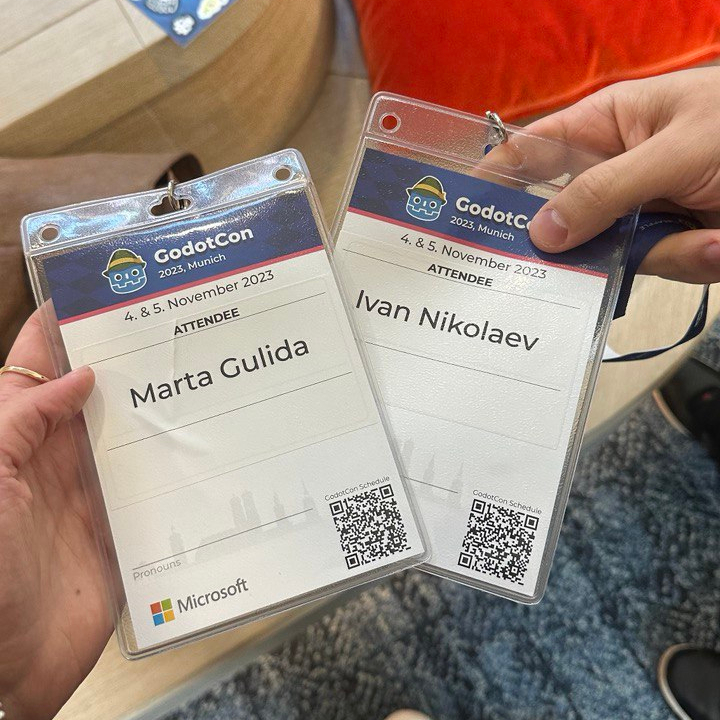
Waiting for Godot...Con
Not long before the conference we started developing a game together. Just for fun, for the joy of learning and experimenting, and not in the last place as a way to stay in touch despite the distances.
The choice of the engine was obvious - while Unreal and Unity have been around for decades, it was Godot and its community that truly embodied the indie spirit for us - making games driven by passion and openness. History and recent events, especially the infamous Unity install fee, have shown that you can't really trust the money-milking corps with your passions.
When we saw the GodotCon 2023 announcement post, we got instantly excited by the idea of meeting with the community of our engine of choice. We subscribed to the mailing list and impatiently waited for the ticket sale. And finally, when the sales began in early September... we arrived late. They were out in hours, by the time we read the mail, none were left. Haven't seen such a thing for a conference of this kind! But we already planned the trip for some time, and as November was approaching, we were becoming worried that we'd miss it. Desperate, we also tried to reach the organizers via various contacts in case there was a way to buy the tickets directly. The only option was to wait for some returned tickets, we were told. So we waited... and got lucky! On Monday of the conference week, we got an email from the organizers that a couple of tickets were made available! Thanks to the kind Emilio and Kerstin, we were on board!
On Friday, the day before the conference, Ivan flew from Vilnius to Riga. By evening, he finally arrived in Munich, where he met Marta. She had come from Freiburg, where she was getting her master's degree at the time.
Location and venue
Saturday, November 4th, first conference day! Germany welcomed us with a sunny and colorful autumn morning, the one you see in postcards and movies:
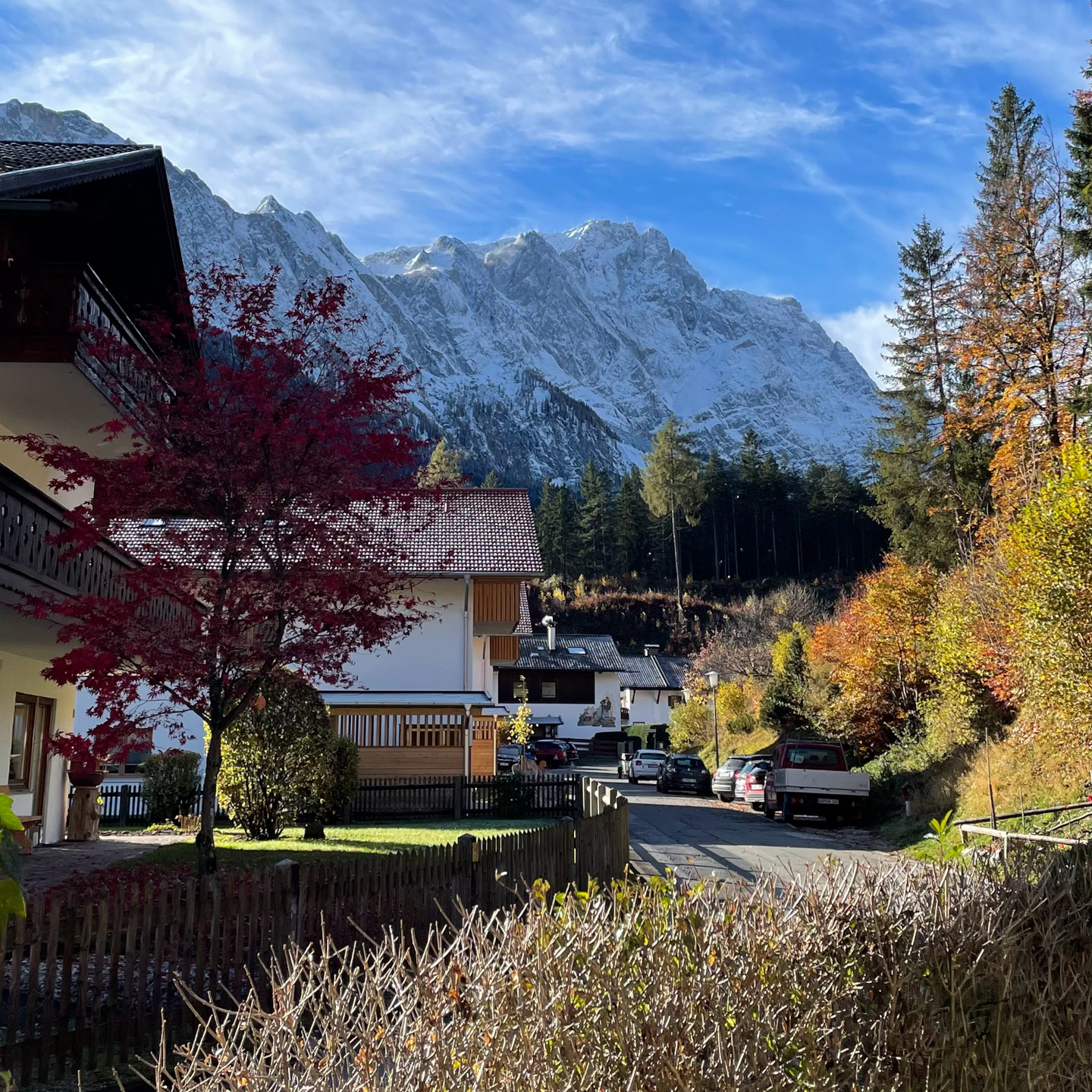
A view of Zugspitze - the highest mountain in Germany.
Getting to Munich from the place of stay in Eibsee took a little more than an hour by car, but with such views around it was worth every minute.
The conference was taking place at Microsoft's headquarters, in a calm central district of Munich. For Ivan, after living 2 years in the small and cozy Vilnius, driving in the suburbs of Muich proved a little challenging even on Saturday. The free parking near the venue was a nice bonus though.
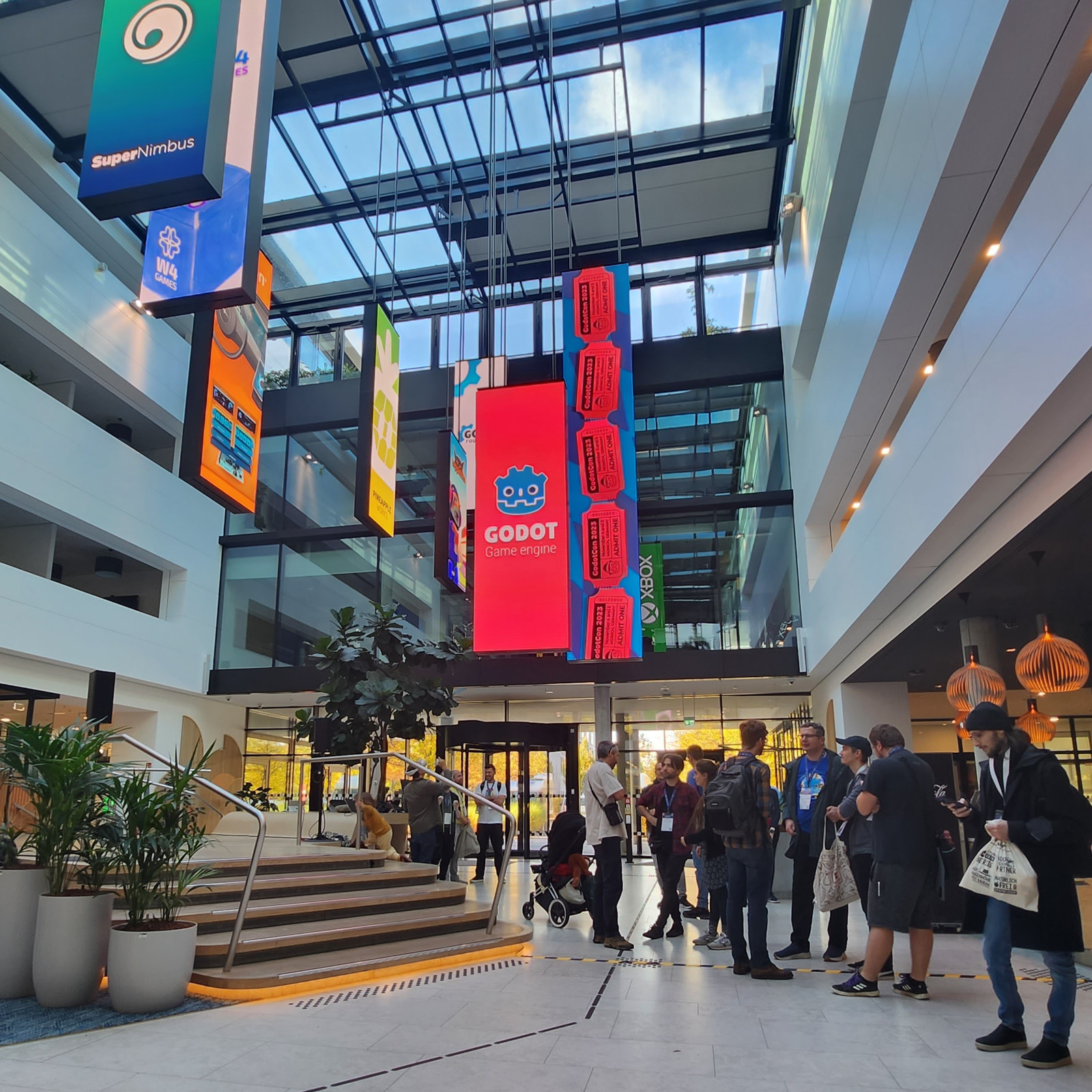
Microsoft HQ atrium. Photo by Laura Heimann.
The conference
We arrived late for the intro talk, and instead of trying to squeeze into a hall, we decided to have a look around, starting from the merch booth. To our surprise, the guy at the booth was the very same Emilio who helped us with the tickets! Later once again we were surprised to discover that Emilio Coppola was one of the core team members, who covered multiple roles in the projects' organization, directed the communication, and apparently, also found time to give a hand at the merch booth. Nice guy, makes a great first networking!
The three halls that hosted the talks and the three common areas turned out to be a perfect fit for the 270 attendees of the conference. A supply of free soft drinks, coffee, and snacks was constantly respawned and helped to stay hydrated and energized throughout the day. The serve-it-yourself lunch at the buffet had both meaty and veggie choices.
But more importantly, the vibe... The vibe was right. However you imagine a community of diverse and passionate indie game devs, well, that was it.
Secured our t-shirts and some cool pins, it was time to plan the attendance. There were two main tracks, with a third one for workshops. We decided to skip the workshops altogether; they were long and didn't interest us much, and we wanted to attend more talks and do some networking.
We also had our little secret mission of trying to showcase for the first time our game project - Junkyard Space Agency. To be honest, we were afraid as f*ck. The game wasn't more than a concept demo, with way more stuff envisioned than implemented. But we wanted feedback and help. Would anyone be interested in this game at all? What features they would like to see? And how in the hell do people implement networked large-world physics, after all? But on that a little later...
Speakers & talks
This is the list of talks we attended with a summary and some feedback. Links to video recordings are provided, in case you'd like to watch them.
Adam Scott - How a C/C++ noob ported DOOM to run in Godot using GDExtension 🔗
A very cool project in which Adam created a custom scene node, inside which a full DOOM game ran.
He embedded a particular fork of DOOM's engine via GDExtension and used Godot's 2D rendering, input handling and sound playback functionality via it.
GDExtension is the new system for extending Godot with native modules. It was introduced in Godot 4.0 and this project is a great example of what it allows to do.
Neil Holmes - How to publish your game on Xbox 🔗
The main takeaway point wasn't said explicitly - "big" platforms are interested in what indie devs are making with Godot. And that's a great signal. The talk itself was delivered as one would expect from a pro, and was interesting too.
We're not sure about what obscure depths those platform SDK's licenses reach, and whether it will be possible at all to release an open-source game on a closed platform such as Xbox, but for Junkyard Space Agency it potentially could be a great way to reach more people, especially kids.
Senad Hrnjadovic - Running an indie game dev studio based on Godot: the Good, the Bad and the Ugly 🔗
"The good, the bad and the ugly" topic delivered by a humble, professional and funny speaker. Great talk, revived those hidden dreams of making our studio and served as great inspiration. It was nice to hear that people bet on Godot for the success of their businesses and they indeed deliver products developed in it to clients.
Miguel de Icaza - Paying my Debt to Society: SwiftGodot 🔗
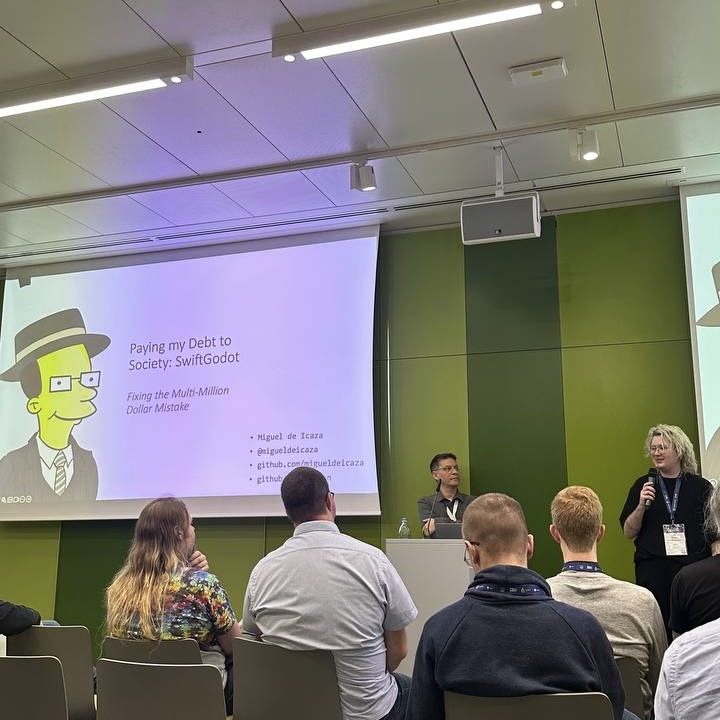
The presentation we witnessed was truly remarkable, exceeding our expectations in every regard. Miguel is a legend among Linux users, and the talk in its well-crafted structure and engaging delivery method captivated us completely — it's the kind of experience you look for at every conference you attend. Every moment spent listening was time well invested.
For now, we're using only GDScript for Junkyard Space Agency, but seems like sooner or later some lower-level native language will be needed for performance-demanding tasks. Ivan's opinion is that writing C++ code shall be the last resort, and seems like Miguel hit right into the spot with this talk. Swift looks promising, its integration is driven by one of the brightest minds in language and compiler development, it looks expressive and yet easy to read, and the GDExtension mechanism seems to provide all the needed access to the engine's systems.
Fernando Costantino - (Simplified) Flight Simulation Library 🔗
What a more "live" presentation, than one made in Godot itself with a... well... live demo of your project? The demo featured a 3D flight simulation game, with autopilot, procedural generation, funny animations and cool physics. This guy knows about flight dynamics much more than both of us combined, and actually, his library might give useful insights into how some things are done. Going to give a peek at those clouds and procedural generation for Junkyard Space Agency.
Jared McClusky, Wojtek Pe - Next-Gen Multiplayer Game Development with The Mirror 🔗
The guys were promoting their platform for live world creation, which rewards content creators. Some kind of mash-up of Second Life and Web3, but probably a niche thing. While the project was ambitious, we found it challenging to identify its target market.
Games showcase and the first demo of Junkyard Space Agency
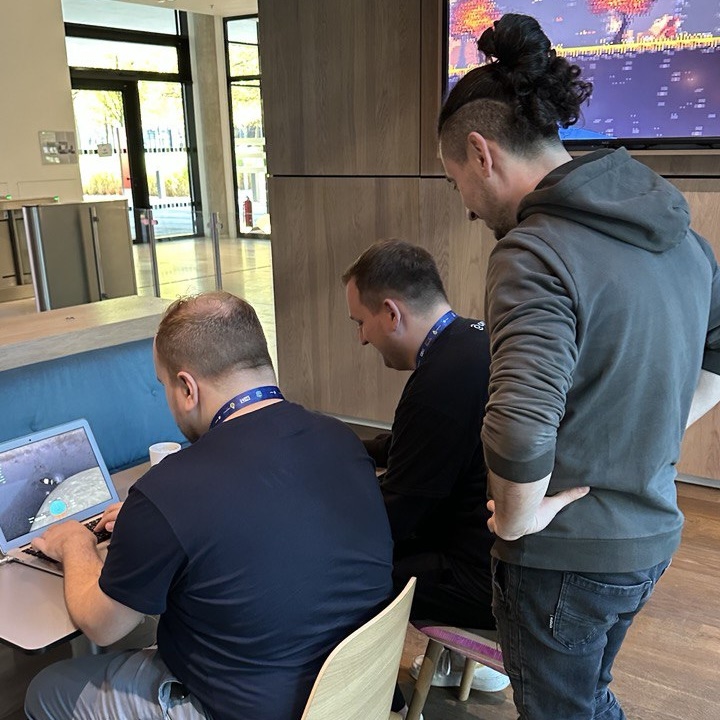
Our first players trying to land their spacecraft on the Moon at the same time! The left one was disadvantaged tho - my 10-year-old Macbook Air acted as client, and playing over WiFi without network prediction was somewhat laggy at moments.
In the atrium, there was a small area with tables and couches where attendees could showcase their projects. We set up a WiFi LAN with our laptops and, after some last-minute fixes, welcomed the eager players with nervous but genuine smiles.
We were convinced that the game was still too embryonic to captivate any audience. After all, the "space sim" wasn't much more than a couple of networked rigid bodies orbiting a Moon-textured sphere, and obeying a very... uhm... "custom" Law of the Universal Gravitation. The rocket engines' simulation was very simplistic and the scale of the solar system was just a few hundred meters across. But most importantly, sharing the passion project you've poured your heart into can be daunting. Doubts can paralyze you - "Is the gameplay engaging enough?", "Will it resonate with anyone?", "Maybe we shall implement more features before unveiling it?" There's a genuine fear that your labor of love will go unnoticed or people will just try it for a few seconds and walk away.
Yet, to our delight, we suddenly found ourselves struggling to handle the steady stream of curious people, eager to experience even the raw demo of our game. People played, watched, laughed, asked questions and were very interested in following the game's development. We were so unprepared for such a reaction, that didn't even think about having a Discord server or creating at least a Twitter account beforehand.
On the way to the conference, we discussed what features would be pivotal to showcase or talk about. We thought that during breaks or in the evening we would polish the visuals, beautify the UI or even add some game mechanics. But after the first day of showcasing, it became evident that we needed basic quality-of-life things such as allowing to restart the game, saving the host IP address or showing an intro screen with the controls map.
Overall, the game demo went surprisingly well, filling us with motivation and inspiration. We created something that other people genuinely liked! This huge adrenaline boost reignited our passion for the project. Ultimately, that's what drives us - we've been working on the prototype since August, squeezing in time during evenings and weekends amidst work, studies, and other adult responsibilities.
Final thoughts
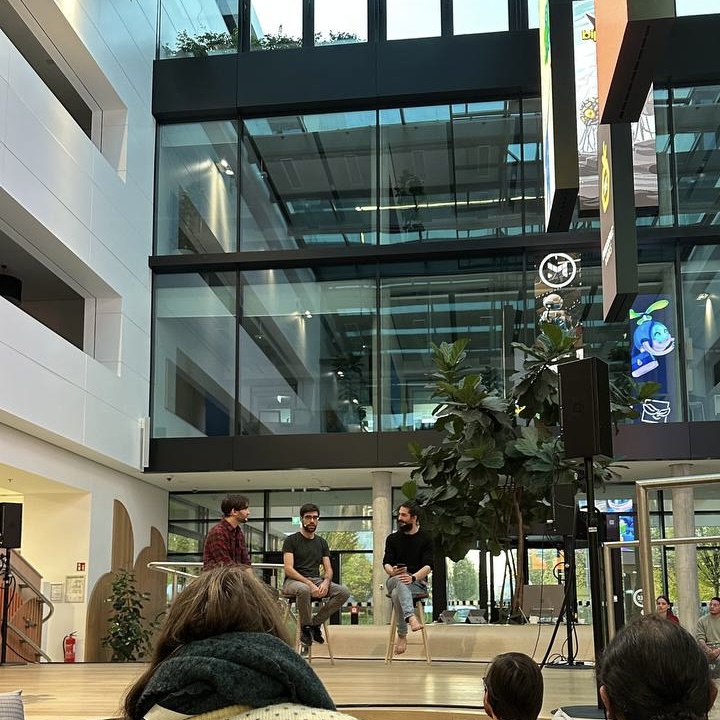
"Fireside" chat
The two days of the conference were closed by a Q&A session that was the icing on the cake. Everyone could ask a question of interest to the main people involved in the process of creating the engine. Some of the questions were related to general plans, and the organizers also took the liberty of openly answering rather complex and tricky questions, thereby greatly endearing them to themselves. This is probably the open community that each true indie usually dreams of.
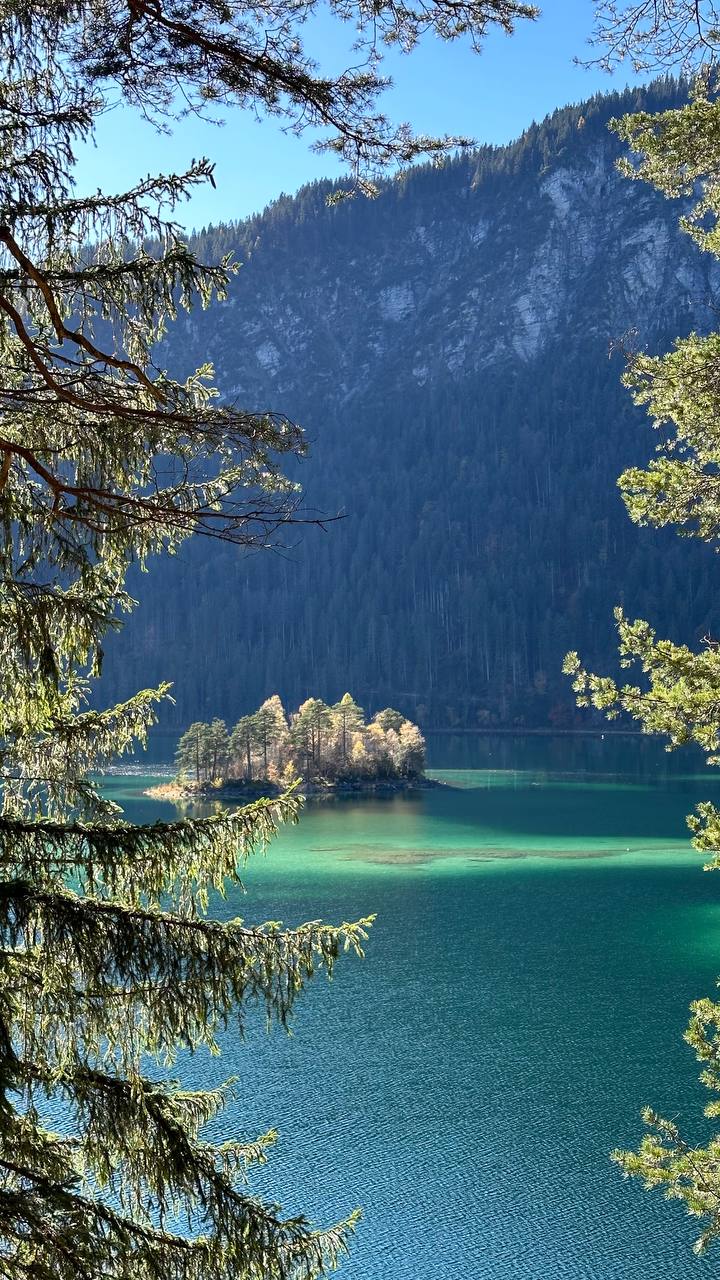
A view of Eibsee that we caught on the last day of our trip.
Although didn't see much of Munich, we spent some quality time walking in the wonderful nature around it, reviving the conference's experience, making plans about the game and looking forward for the next GodotCon.